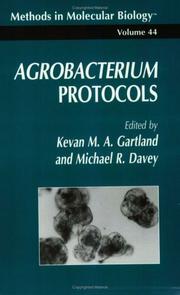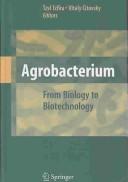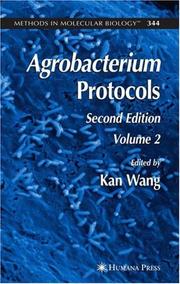| Listing 1 - 4 of 4 |
Sort by
|

ISBN: 0896033023 9786610836536 1280836539 1592595316 1489927999 9780896033023 Year: 1995 Volume: 44 Publisher: Totowa (N.J.): Humana press,
Abstract | Keywords | Export | Availability | Bookmark
 Loading...
Loading...Choose an application
- Reference Manager
- EndNote
- RefWorks (Direct export to RefWorks)
Agrobacterium Protocols offers beginning and experienced researchers the most comprehensive collection of step-by-step protocols for the genetic manipulation of plants using Agrobacterium. The topics range from the maintenance of bacterial culture collections to aspects of the metabolism and physiology of transformed tissues and transgenic plants. Drawing on the work of leading scientists from laboratories around the world, Agrobacterium Protocols provides a wealth of techniques for introducing specific DNA sequences into target plant species and discusses the environmental implications of genetically engineered plants. Its detailed procedures will facilitate rapid transfer of advanced techniques to other laboratories and their exploitation in fundamental and applied plant biology.
Agricultural biotechnology --- Agrobacterium --- Agricultural biotechnology. --- Agrobacterium. --- Agro-biotechnology --- Biotechnology --- Polymonas --- Rhizobiaceae --- Cytology. --- Cell Biology. --- Cell biology --- Cellular biology --- Biology --- Cells --- Cytologists
Book
ISBN: 3030032574 3030032566 Year: 2018 Publisher: Cham : Springer International Publishing : Imprint: Springer,
Abstract | Keywords | Export | Availability | Bookmark
 Loading...
Loading...Choose an application
- Reference Manager
- EndNote
- RefWorks (Direct export to RefWorks)
This volume reviews various facets of Agrobacterium biology, from modern aspects of taxonomy and bacterial ecology to pathogenesis, bacterial cell biology, plant and fungal transformation, natural transgenics, and biotechnology. Agrobacterium-mediated transformation is the most extensively utilized platform for generating transgenic plants, but modern biotechnology applications derive from more than 40 years of intensive basic scientific research. Many of the biological principles established by this research have served as models for other bacteria, including human and animal pathogens. Written by leading experts and highlighting recent advances, this volume serves both as an introduction to Agrobacterium biology for students as well as a more comprehensive text for research scientists.
Agrobacterium. --- Polymonas --- Rhizobiaceae --- Microbiology. --- Microbial genetics. --- Microbial genomics. --- Agriculture. --- Medical Microbiology. --- Microbial Genetics and Genomics. --- Farming --- Husbandry --- Industrial arts --- Life sciences --- Food supply --- Land use, Rural --- Genomics --- Microbial genetics --- Microorganisms --- Genetics --- Microbiology --- Microbial biology --- Biology --- Medical microbiology.

ISBN: 1281141291 9786611141295 0387722904 0387722890 1441924736 Year: 2008 Publisher: New York : Springer,
Abstract | Keywords | Export | Availability | Bookmark
 Loading...
Loading...Choose an application
- Reference Manager
- EndNote
- RefWorks (Direct export to RefWorks)
Agrobacterium is the only cellular organism on Earth that is naturally capable of transferring genetic material between the kingdoms of life, from prokaryotes to eukaryotes. Studies have uncovered a wealth of information on the process of Agrobacterium-mediated genetic transformation and on the bacterial and host cell factors involved in the infection. Agrobacterium has been shown to genetically transform, under laboratory conditions a large number of plant species and numerous non-plant organisms, indicating the truly basic nature of the transformation process. It is therefore not surprising that Agrobacterium and the genetic transformation itself have also become the focus of numerous ethical and legal debates. ‘Agrobacterium’ is a comprehensive book on Agrobacterium research, including its history, application, basic biology discoveries, and effects on human society. Although the book largely focuses on providing a detailed review of virtually all molecular events of the genetic transformation process, it also provides coverage of ethical and legal issues relevant to the use of Agrobacterium as a "genetic transformation machine". The result is an all-inclusive text which readers—including scientists and students involved in plant genetic engineering—will find useful as a reference source for all major aspects of the Agrobacterium-mediated genetic transformation of plant and non-plant organisms. About the Editors: Dr. Tzvi Tzfira is an Assistant Professor in the Department of Molecular, Cellular, and Developmental Biology at the University of Michigan. Dr. Vitaly Citovsky is a Professor in the Department of Biochemistry and Cell Biology at Stony Brook University.
Agrobacterium. --- Polymonas --- Rhizobiaceae --- Botany. --- Bacteriology. --- Biotechnology. --- Plant genetics. --- Plant diseases. --- Agriculture. --- Plant Sciences. --- Plant Genetics and Genomics. --- Plant Pathology. --- Farming --- Husbandry --- Industrial arts --- Life sciences --- Food supply --- Land use, Rural --- Botany --- Communicable diseases in plants --- Crop diseases --- Crops --- Diseases of plants --- Microbial diseases in plants --- Pathological botany --- Pathology, Vegetable --- Phytopathology --- Plant pathology --- Plants --- Vegetable pathology --- Agricultural pests --- Crop losses --- Diseased plants --- Phytopathogenic microorganisms --- Plant pathologists --- Plant quarantine --- Genetics --- Chemical engineering --- Genetic engineering --- Microbiology --- Botanical science --- Phytobiology --- Phytography --- Phytology --- Plant biology --- Plant science --- Biology --- Natural history --- Pathology --- Diseases and pests --- Diseases --- Wounds and injuries --- Plant science. --- Plant pathology. --- Floristic botany

ISBN: 1588298434 9786610832316 1280832312 1597451312 1588295362 1597451304 9781588295361 1280832304 9786610832309 Year: 2007 Publisher: Totowa, NJ : Humana Press : Imprint: Humana,
Abstract | Keywords | Export | Availability | Bookmark
 Loading...
Loading...Choose an application
- Reference Manager
- EndNote
- RefWorks (Direct export to RefWorks)
Agrobacterium tumefaciens is a soil bacterium that for more than a century has been known as a pathogen causing the plant crown gall disease. Unlike many other pathogens, Agrobacterium has the ability to deliver DNA to plant cells and permanently alter the plant genome. The discovery of this unique feature 30 years ago has provided plant scientists with a powerful tool to genetically transform plants for both basic research purposes and for agric- tural development. Compared to physical transformation methods such as particle bomba- ment or electroporation, Agrobacterium-mediated DNA delivery has a number of advantages. One of the features is its propensity to generate single or a low copy number of integrated transgenes with defined ends. Integration of a single transgene copy into the plant genome is less likely to trigger “gene silencing” often associated with multiple gene insertions. When the first edition of Agrobacterium Protocols was published in 1995, only a handful of plants could be routinely transformed using Agrobacterium. Ag- bacterium-mediated transformation is now commonly used to introduce DNA into many plant species, including monocotyledon crop species that were previously considered non-hosts for Agrobacterium. Most remarkable are recent devel- ments indicating that Agrobacterium can also be used to deliver DNA to non-plant species including bacteria, fungi, and even mammalian cells.
Agrobacterium. --- Agricultureal biotechnology. --- Polymonas --- Agrobacterium --- Rhizobiaceae --- Rhizobium radiobacter --- Alphaproteobacteria --- Gram-Negative Aerobic Rods and Cocci --- Proteobacteria --- Gram-Negative Aerobic Bacteria --- Agrobacterium tumefaciens --- 579.841.32 --- 579.841.32 Agrobacterium --- Isolation & purification --- Gram Negative Bacteria --- Proteobacteria alpha --- alpha Proteobacteria --- Bacteriologic Technic --- Bacteriologic Technics --- Bacteriologic Techniques --- Bacteriological Technique --- Technic, Bacteriological --- Technics, Bacteriological --- Technique, Bacteriological --- Techniques, Bacteriological --- Bacteriologic Technique --- Bacteriological Technic --- Bacteriological Technics --- Technic, Bacteriologic --- Technics, Bacteriologic --- Technique, Bacteriologic --- Techniques, Bacteriologic --- Agrobacterium radiobacter --- Methodological Studies --- Methodological Study --- Studies, Methodological --- Study, Methodological --- Method --- Gram Negative Aerobic Bacteria --- Achromatiaceae --- Achromatium --- Achromobacteriaceae --- Bacteria, Purple --- Purple Bacteria --- Gram Negative Aerobic Rods and Cocci --- Rhizobium galegae --- Rhizobium lupini --- Agricultural biotechnology --- 57.083 --- Bacteriological Techniques --- Genetic Techniques --- Agro-biotechnology --- Biotechnology --- Genetic Technic --- Genetic Technics --- Genetic Technique --- Technic, Genetic --- Technics, Genetic --- Technique, Genetic --- Techniques, Genetic --- Genetics --- Genetic Counseling --- Genetic Phenomena --- 57.083 Microbiological, virological, immunological methods and techniques --- Microbiological, virological, immunological methods and techniques --- genetics --- isolation & purification --- methods --- Genetic Techniques. --- Agricultural biotechnology. --- Methods --- Botany. --- Plant Sciences. --- Botanical science --- Phytobiology --- Phytography --- Phytology --- Plant biology --- Plant science --- Biology --- Natural history --- Plants --- Floristic botany
| Listing 1 - 4 of 4 |
Sort by
|

 Search
Search Feedback
Feedback About UniCat
About UniCat  Help
Help News
News